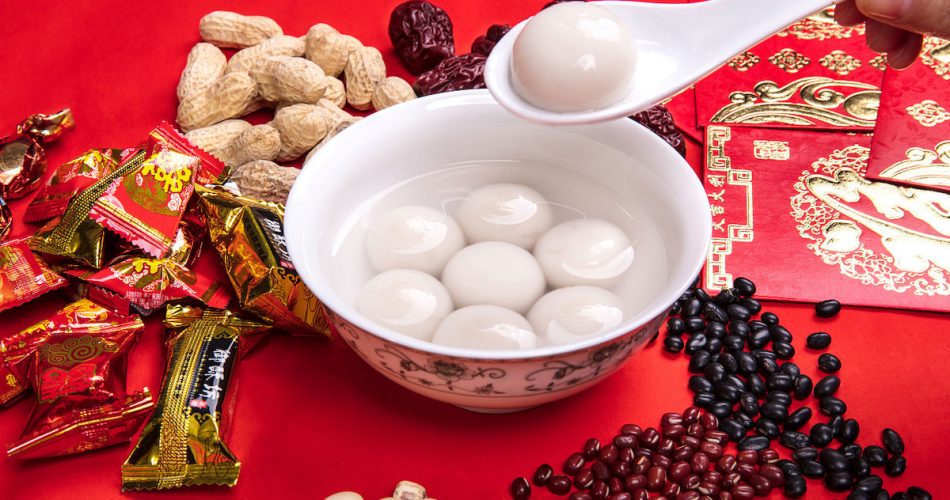“Tang Yuan” (汤圆) in English:
- glue pudding
- sweet soup balls
- Dumplings
- sweet dumpling
- Yuanxiao/Yuanxiao Dumplings
The 15th day of the first month of the lunar calendar marks a traditional Chinese festival, the Lantern Festival. In China, the Lantern Festival is a crucial traditional festival only second to the Chinese Spring Festival. The Lantern Festival, the Spring Festival, and the Mid-Autumn Festival are known as the three most important traditional Chinese folk festivals.

On this day, almost every family eats sweet dumplings.
Do you know why Chinese people eat glue pudding on the day of the Lantern Festival?
Table of Contents
- 1. The tradition of eating dumplings during the Lantern Festival originates from the story of the “Lantern Girl”
- 2. Folklore experts’ answer about why eating sweet soup balls on Lantern Festival
- 3. The way to maintain health: Eating dumplings in spring to protect against the cold and replenish the “Qi” (vital energy in English)
- 4. Different ways to eat soup dumplings
- 5. About the origin of the Lantern Festival
1. The tradition of eating dumplings during the Lantern Festival originates from the story of the “Lantern Girl”
A dumpling is a kind of small, round, and stuffed snack made from glutinous rice. It is also called “Soup dough”.
In China, people in the south call Tang-yuan “dumplings” and in the north, they call them “Yuanxiao” (made from sticky rice flour with fillings such as sugar, walnuts, sesame, rose petals, and bean paste in round shape). The custom of eating Tang-yuan or Yuanxiao dumplings on the day of the Lantern Festival began as early as the Han Dynasty in China.
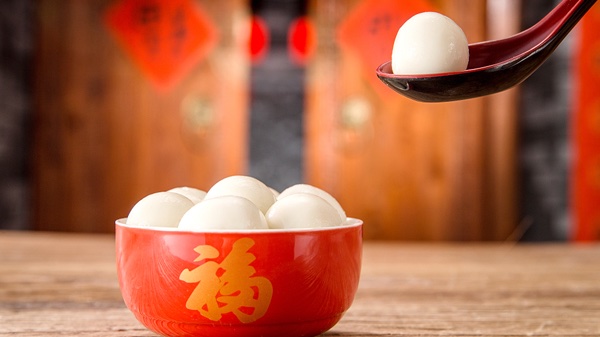
Legend has it that during the reign of Emperor Wu of the Han Dynasty, there was a palace maid named “Yuan Yao” who was living in seclusion in the palace for many years and missed her parents so much that she spent her days in tears.
There was a minister by the name of Dongfang Shuo who was highly trusted by Emperor Wu of the Han Dynasty. One day, when Dongfang Shuo went to the imperial garden to pick plum blossoms for Emperor Wu, he had just entered the garden when he saw a palace maid about to jump into a well to commit suicide.
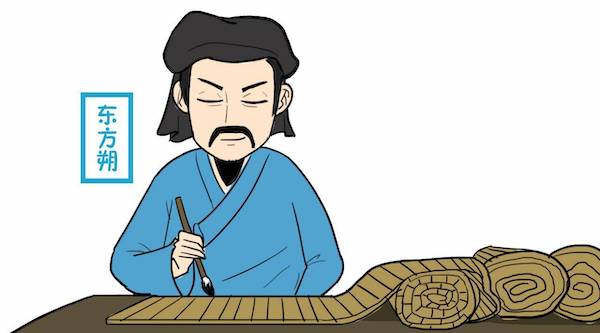
(Dongfang Shuo)
Dongfang Shuo saved the palace maid and asked her why she wanted to commit suicide. The palace maid said her name was “Yuanxiao” (元宵) and that her parents were alive and that she had a sister, but she had not been able to see them since she entered the palace.
She missed them so much that the thought of not being able to do her filial duty for her parents made her think that she might as well die.
Knowing what was on her mind, Dongfang Shuo decided to help her.
So Dongfang Shuo said to the Yuanxiao palace maid, “I will help you see your loved ones, so stop seeking death.” Hearing that there was still a chance to be reunited with her family, the Yuanxiao palace maid immediately nodded her head and said that she would never seek death again.
To help this girl meet her parents and sister, Fang Shuo left the palace, dressed up as a fortune-teller, and set up a fortune-telling stall on Chang’an Street. Dongfang Shuo was so eloquent and articulate that many people came to him for divination.
No matter what the person sought, he would always tell them “Fire will burn the body on the 16th day of the first month”. For a while, people in the imperial city of Chang’an were going crazy with rumors that many people might die on the 16th day of the first month.
When people resorted to Dongfang Shuo for solutions, he told them, “On the evening of the 15th day of the first month, a red-clad goddess descends to Earth, and she is the messenger to burn Chang’an city; I have copied the verse, and the emperor may have a solution”. Thereupon, Dongfang Shuo left a red note and left.
Thus, the red note left by Dongfang Shuo was taken into the palace. The Emperor of the Han Dynasty opened the note, only to see “Chang’an city is in the midst of a robbery, the emperor’s palace is to be burned, and the night is red with flame”.
After reading the red note, Emperor Wu was at a loss about what to do, so he called for Dongfang Shuo and presented him with the red note. Dongfang Shuo was asked to figure out solutions.
Dongfang Shuo pretended to be seeing the note for the first time and pretended to think about it for a long time before finally telling Emperor Han Wu, “The God of Fire loves dumplings. Isn’t there a palace maid called ‘Yuanxiao’ who specializes in making dumplings?; On the night of the 15th day, we can ask the maid Yuanxiao to make dumplings and His Majesty personally burned incense and made offerings; Moreover, His Majesty had to give two orders: one was to order every household in Chang’an city to make soup dumplings to honor the Fire God, and another order was to order people to hang lanterns on the 15th night and set off fireworks in the whole city so that the gods in heaven would think that the earth had been burnt by fire; Also, Your Majesty can also send someone to inform the people outside the city to enter the city on the 15th night to watch the lanterns so that they can escape this disaster”.
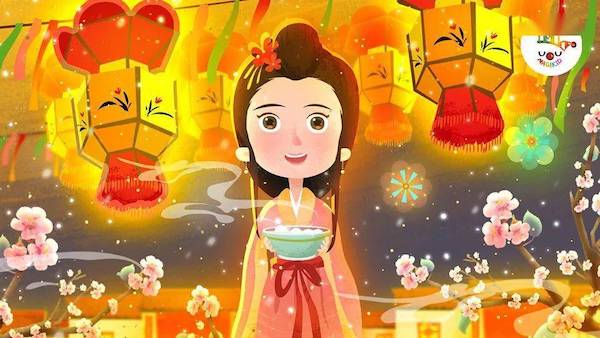
Emperor Wu was so pleased that he didn’t expect Dongfang Shuo to have a real solution. He then immediately gave a decree as per the words of Dongfang Shuo.
So, on the night of the Lantern Festival, the 15th day of the first month, the city of Chang’an was decorated with lanterns and was very lively.
People from outside the city came into the city, among whom were “Yuanxiao” the maid’s parents and sister. They looked at the various lanterns and got surprised to see a large lantern with the word “Yuanxiao” written on it that they immediately shouted the name of the “Yuanxiao”.
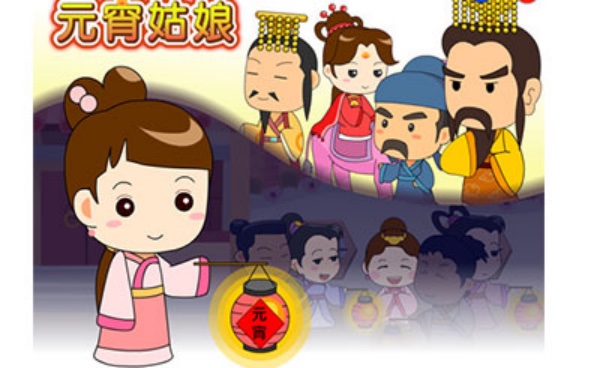
(Yuanxiao finally getting reunited with her family)
The girl “Yuanxiao” heard the voices of her family and was finally reunited with them. The whole city survived the 15th day of the first month unscathed. However, Emperor Wu of Han still held fear about the rumor.
Therefore, after that, he ordered that every year on the 15th day of the first month, soup dumplings should be made for the fire god, and fireworks and firecrackers should be set off throughout the city.
Ever since then, the custom of eating dumplings on the 15th day of the first month of the lunar calendar (on the Lantern Festival), has been passed down.
2. Folklore experts’ answer about why eating sweet soup balls on Lantern Festival
Of course, it can only be a folklore that the custom of eating Tang-yuan or Yuanxiao dumplings on the Lantern Festival comes from the story of the maid “Yuanxiao”.
In line with Chinese folklore experts, when people cooked the dumplings, they found them floating on the water after the pot was opened, making them look very pretty and reminiscent of a bright moon hanging in the sky.
Admittedly, in China, the bright moon often delivers longing for friends and family and the hope of reunion. The bright moon in the sky and the dumplings carry people’s wishes for a reunion.
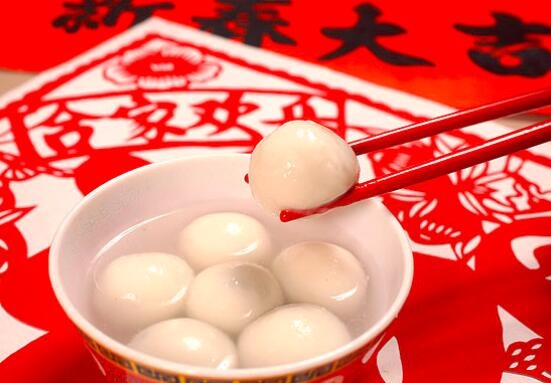
(Eating Tang-yuan delivering people’s great wish for a family reunion)
Additionally, in China, the pronunciation of the word “dumpling” is similar to that of the word “Tuanyuan” (reunion in Chinese), which means reunion and symbolizes family reunion and happiness.
In this regard, eating soup dumplings on the 15th day of the first month is an expression of the Chinese people’s hopes for family reunion and happiness.
3. The way to maintain health: Eating dumplings in spring to protect against the cold and replenish the “Qi” (vital energy in English)
Apart from signifying family reunion, eating dumplings on the Lantern Festival also helps protect against the cold, nourish the spleen and stomach, and improve lung energy.
Glutinous rice is the main ingredient of sweet dumplings. In the Chinese medical book, Compendium of Materia Medica, glutinous rice is a grain that nourishes the spleen and stomach, protects against cold, and benefits the lung and “qi”. Sweet and warm, glutinous rice nourishes the body’s “qi” and blood and nourishes the spleen and stomach.
In winter, the cold weather tends to make people lose “qi” in their stomachs. The first month of the year marks the beginning of spring and the weather is still warm and cold.
Hence, the ancient Chinese used glutinous rice material to make dumplings to keep the cold at bay and to nourish the “qi” and blood, especially for those with a weak spleen and stomach.
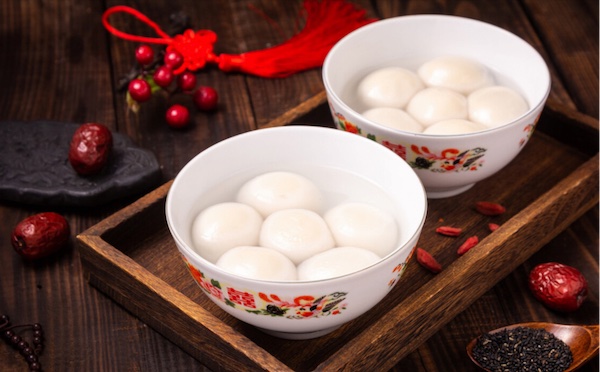
In addition, glutinous rice is rich in protein, calcium, phosphorus, iron, niacin, and other nutrients. For this part, the sweet ball dumplings are indispensable in warming and strengthening the body.
4. Different ways to eat soup dumplings
The Yuanxiao dumplings are round in shape with various fillings, including peanuts, sesame, bean paste, and so on. These dumplings are elastic and delicious.
In China, there are many other ways to eat dumplings apart from boiling.
Deep fried dumplings
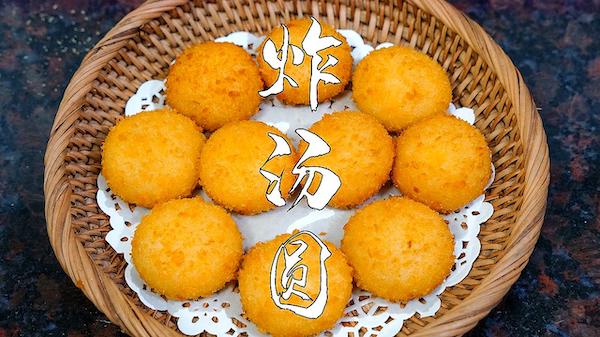
Heat the oil and gently fry the dumplings made from glutinous rice flour in the oil until the dumplings turn golden yellow. You can take out the dumplings with a colander. Deep-fried dumplings boast crispy skin and a sticky, sweet, and savory flavor.
Shredded Dumplings
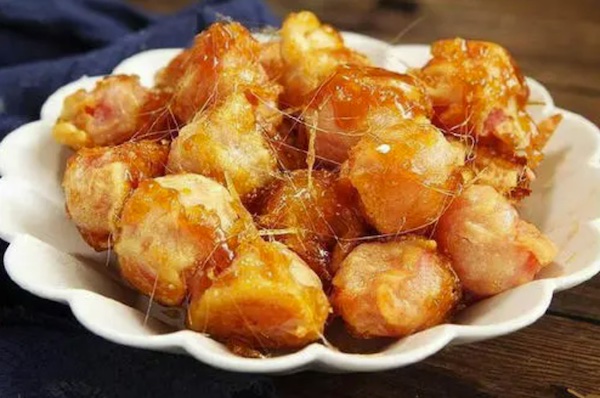
Take Tang-yuan out of refrigerators without unfreezing them. Pour enough oil into the pan, add dumplings in batches into the pan when the oil is medium hot, and use chopsticks to poke away Tang-yuan to prevent sticking. Take out the dumplings with a colander until they turn golden yellow.
Leave a little oil in the pan, add the sugar, and simmer over medium heat until the syrup is golden brown and thick.
After that, add fried Tang-yuan into the pan and stir and fly Tang-yuan until the dumplings are fully and evenly covered by syrup.
Eat the Tang-yuan when it is hot.
Soup Dumpling with Fruit

Cut the plums into small pieces, dice the plums, bananas, and watermelon, and put the water in a pot.
Boil the water and put the dumplings into the hot water, and then take them out and let them cool.
Place yogurt in a container, add the cooled dumplings, then the diced fruit, and finally the plums, and top with a dollop of blueberry sauce.
Chill the finished fruit salad in the fridge for a while before serving. The sweet ball dumplings are cool and exceptionally delicious.
5. About the origin of the Lantern Festival
For now, you must have known why Chinese people eat “Tang-yuan” or “Yuanxiao” during the Lantern Festival, but do you know where the Lantern Festival (Yuanxiao Festival) comes from?
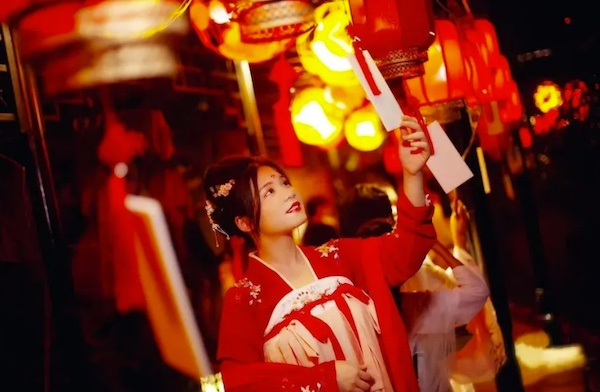
Also known as Shang Yuan Festival, and Yuan Xi, the Lantern Festival is the first major festival in China after the Spring Festival.
The first month (“正” in Chinese) is the first month of the Chinese lunar calendar, and the ancient people called the night “night”.
The 15th day of the first month is the first full moon of the year, which is why the ancient Chinese celebrated the 15th day of the first month as the Lantern Festival.
According to records, the Lantern Festival has been around since the Han Dynasty and has a history of over 2,000 years.
According to historical records, the Lantern Festival has been around since the Han Dynasty, so it has a history of over 2,000 years. Throughout the historical course, it was Emperor Liu Heng of the Western Han Dynasty that name the 15th day of the first month Lantern Festival.
In June 2008, the Lantern Festival was selected as one of China’s National Intangible Cultural Heritage.
To celebrate the Lantern Festival, beyond eating dumplings, Chinese people also watch lanterns, guess lantern riddles, play dragon lanterns, play lions, walk on stilts, and play Taiping drums.
